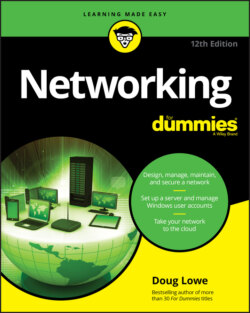Читать книгу Networking For Dummies - Lowe Doug, Doug Lowe - Страница 21
It’s Not a Personal Computer Anymore!
ОглавлениеIf I had to choose one point that I want you to remember from this chapter more than anything else, it’s this: After you hook up your personal computer (PC) to a network, it’s not a “personal” computer anymore. You’re now part of a network of computers, and in a way, you’ve given up one of the key concepts that made PCs so successful in the first place: independence.
I got my start in computers back in the days when mainframe computers ruled the roost. Mainframe computers are big, complex machines that used to fill entire rooms and had to be cooled with chilled water. I worked with an IBM System 370 Model 168. It had a whopping 8MB of memory. (The computer on which I’m writing this book has 3,000 times as much memory.)
Mainframe computers required staffs of programmers and operators in white lab coats just to keep them going. The mainframes had to be carefully managed. A whole bureaucracy grew up around managing them.
Mainframe computers used to be the dominant computers in the workplace. Personal computers changed all that: They took the computing power out of the big computer room and put it on the user’s desktop, where it belongs. PCs severed the tie to the centralized control of the mainframe computer. With a PC, a user could look at the computer and say, “This is mine — all mine!” Mainframes still exist, but they’re not nearly as popular as they once were.
But networks have changed everything all over again. In a way, it’s a change back to the mainframe-computer way of thinking: central location, distributed resources. True, the network isn’t housed in a separate building. But you can no longer think of “your” PC as your own. You’re part of a network — and like the mainframe, the network has to be carefully managed.
Here are several ways in which a network robs you of your independence:
You can’t just indiscriminately delete files from the network. They may not be yours.
You’re forced to be concerned about network security. For example, a server computer has to know who you are before it allows you to access its files. So you have to know your user ID and password to access the network. This precaution prevents some 15-year-old kid from hacking his way into your office network by using its Internet connection and stealing all your computer games.
You may have to wait for shared resources. Just because Bart sends something to Homer’s printer doesn’t mean that it immediately starts to print. Lisa may have sent a two-hour print job before that. Bart will just have to wait.
You may have to wait for access to documents. You may try to retrieve an Excel spreadsheet file from a network drive, only to discover that someone else is using it. Like Bart, you just have to wait.
You don’t have unlimited storage space. If you copy a 100GB video file to a server’s drive, you may get calls later from angry co-workers complaining that no room is left on the server’s drive for their important files.
Your files can become infected from viruses given to you by someone over the network. You may then accidentally infect other network users.
You have to be careful about saving sensitive files on the server. If you write an angry note about your boss and save it on the server’s hard drive, your boss may find the memo and read it.
The server computer must be up and running at all times. For example, if you turn Homer’s computer into a server computer, Homer can’t turn his computer off when he’s out of the office. If he does, you can’t access the files stored on his computer.
If your computer is a server, you can’t just turn it off when you’re finished using it. Someone else may be accessing a file on your hard drive or printing on your printer.
